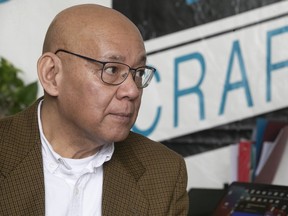A decreasing share of complaints to the province’s Police Ethics Commissioner are resulting in inquiries.

Racialized victims of police misconduct are struggling to have their complaints investigated, a Montreal-based anti-racism organization said Friday.
The Centre for Research-Action on Race Relations (CRARR) is pointing to three incidents of alleged police racism and misconduct and subsequent refusals of Quebec’s Police Ethics Commissioner to investigate as evidence of shortfalls in the province’s police ethics system.
CRARR executive director Fo Niemi addressed reporters Friday morning alongside four individuals whose requests for an investigation had been dismissed. The bar for an investigation has risen over time, Niemi said, pointing to data that shows a decreasing percentage of complaints resulting in inquiries from year to year.
The press conference featured testimony from Nesean Dayle, who is Black and was handcuffed by police in August 2023 when shopping with his wife and daughter at Carrefour Angrignon in LaSalle. Dayle said he had been mistaken for another individual and the police officers refused to explain why they were arresting him. “The officer looked at me and said you’re Black with dreads, I’m going to arrest you,” he said.
Dayle said he was escorted to a police car, with his wife and child witnessing the incident. Police then drove him to a nearby Bureau en Gros, where staff had made the call leading to his wrongful arrest, said his wife, Ourida Kara. Kara said staff there told police they had the wrong individual, but police didn’t offer any apology or information to the family about how they might seek recourse. “The whole incident was just traumatic, especially for our daughter,” Kara said, adding her daughter no longer trusts police.
Brandon, who asked his last name not be published, said police showed up at his Lachine apartment in March 2024 after a neighbour phoned in a noise complaint. Brandon, who is Black, said police “essentially pushed their way in,” to his apartment after saying they had concerns about domestic abuse. But Brandon said his neighbour later told him he had made no mention of domestic abuse and had told the operator Brandon was playing with his child.
Brandon said he was struck three times by a police officer: first shoved in the chest as police entered his apartment, then elbowed and, finally, hit on the hand when he started filming. A video shown to reporters shows a police officer refusing to disclose his badge number and then appearing to hit the hand holding the phone.
Nay Ir said police removed her from a McDonald’s on St. Jacques Rd. W. in March 2023 after a manager incorrectly reported her to police for begging for money inside the restaurant. Ir said she had been by earlier to buy food and had parked outside to use the washroom. After police removed her from the McDonald’s, Ir said she showed them her parked car, where her son was waiting for her, but police refused to let her back into the restaurant. Ir said she felt targeted for being Asian and for the way she was dressed. “I felt very humiliated,” she said. “I was crying on my way home.”
The Quebec Police Ethics Commission took all three incidents to conciliation, a process in which police sit across from the individuals accusing them of misconduct. Following conciliation, the individuals are asked whether they still want an inquiry. In all three cases, the commission turned down the requests for inquiry. Dayle and Ir both appealed the decision and had their appeals denied. Brandon is still waiting for a response to his appeal.
Niemi said the incidents show an over-reliance on a “kiss and make up,” approach to the ethics process. He said all three incidents were serious, the victims had evidence and they merited inquiries.
In both 2022/23 and 2023/24, only four per cent of complaints to the commission resulted in inquiries, compared with seven per cent in 2020/21 and 2021/22 and six per cent in 2019/20.
The fact a smaller share of complaints result in inquiries could “signify a trend to lower the standards of policing and to lower the standards of police ethics and enforcement,” Niemi said.
But in a statement sent to The Gazette, the Police Ethics Commission defended the conciliation system, which it said “enables the parties to explain their perceptions of the event in a respectful, structured environment,” and helps police officers understand the effect of their actions.
To go forward with an inquiry, the commissioner “must be of the opinion that there’s a reasonable probability of proving an ethics lapse,” which is a very high threshold, the statement said. According to the commission, the decision not to hold an inquiry “is not a judgement of the value the commissioner places on a given situation, but a question of proof.”
But for those whose requests were turned down, the status quo won’t do. Kara said she would’ve liked to see the police officers who handcuffed her husband suspended. “If we keep accepting it, it’s going to keep occurring over and over,” she said.
“Take our complaints more seriously,” Niemi said.